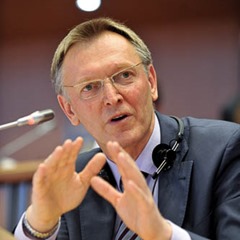Europe’s environment
 Commissioner Janez Potocnik answers agendaNi’s questions about the state of European environmental policy and the main areas for action going forward.
Commissioner Janez Potocnik answers agendaNi’s questions about the state of European environmental policy and the main areas for action going forward.
What is your overall assessment of Europe’s environment?
Overall, it’s a mixed picture. Europe’s environment is protected by the most comprehensive modern standards seen anywhere in the world. They have brought significant reductions in pollutant emissions in recent decades, so EU citizens enjoy a level of water quality that is among the best in the world. And nearly 20 per cent of the union’s land mass is designated as protected areas for nature.
But not all the trends are going in the right direction. We import the great majority of our natural resources, and most waste is still not properly managed. Air pollution levels remain high in many parts of Europe where hundreds of thousands still die prematurely from the effects each year, and citizens are still exposed to hazardous substances.
The last time we assessed protected species and habitats, only 17 per cent were in favourable status. Unsustainable land use is consuming fertile soils, and soil degradation continues. So there is plenty of room for improvement.
What do you count as your main achievements as Commissioner?
I have focused my efforts in three main areas. First of all, on waste, with new rules on waste electrical and electronic equipment, more controls on waste shipments to prevent illegal exports, and new rules for dismantling ships and legislation on the way to reduce the use of plastic bags. Waste has been reduced and productivity has improved as a result.
Secondly, the last few years have seen decisive steps to preserve and restore natural capital. We have a new biodiversity strategy with concrete actions to help halt the loss of biodiversity and ecosystem services in the EU by 2020. These cover a range of issues, from better protection for ecosystems and more use of green infrastructure to more sustainable agriculture and forestry.
And then thirdly, we are working better with member states to help them get tangible benefits from better implementation of EU environmental legislation. To give you one example, over 1,800 agglomerations of all sizes now have an urban waste water treatment facility in conformity with EU rules as a result of infringement actions during this mandate.
 Aside from climate change, what is the big issue to tackle going forward?
Aside from climate change, what is the big issue to tackle going forward?
Transforming the EU into a resource-efficient, low-carbon economy has to be the centrepiece of the long-term agenda. Moving to a circular economy and a recycling society is a key component of this. We’ve tried to plot out a path, with roadmaps, targets and milestones. The new EU Environment Action Programme to 2020 – ‘Living well, within the limits of our planet’ – sets out a vision for 2050, milestones for 2020, and a comprehensive framework for action based on a broad definition of resources – from metals and minerals to ecosystems, biodiversity, water, air, land and soil. You have to think of the long-term goal here, but you need incremental steps along the way.
What innovations have taken place since 2009?
There are a number I can think of. The new biodiversity strategy, the blueprint for Europe’s water resources and the clean air policy package we released last year all had innovative elements, but the one that stands out is the new EU Environment Action Programme.
Past programmes tended to focus on specific environmental issues in isolation. The new approach is to consider the inter-relations between the issues, and to seek improvements in areas that can maximise the benefits environment policy can deliver for the economy and society. And this time we have buy-in from the member states and the European Parliament, and a commitment to a limited number of priority objectives and what it takes to achieve them.
Where is the main room for improvement for member states?
The EU has been making environment policy for several decades now, so most of the legislation we need is in place, but it needs to work well on the ground. The benefits – not just for human health and the environment, but for business too – are immense. One study done under this Commission has showed that full implementation of EU environmental legislation will bring an annual benefit of €50 billion at EU level. That’s an enormous sum, and we are talking about direct benefits in terms of growth, jobs and well-being across the continent. Better implementation of environmental legislation is excellent value for money. It’s the sort of win-win investment for the environment and the economy that we have to capitalise on in times of crisis.
 Do you see a need to recognise the intrinsic value of the environment?
Do you see a need to recognise the intrinsic value of the environment?
Most of the people do appreciate the mysterious beauty of wild flora and fauna. So as well as publicising the economic case for protecting the environment (which is very strong), we also try and capture some of that feeling in our communication activities – a feeling of respect, awe even, for the power of nature, and a sense that we aren’t just doing this for society.
We are doing it because we have a feeling that the environment somehow deserves protecting. And of course, even people who don’t get that feeling from nature can’t deny its spiritual or aesthetic importance for others. That needs to be respected.
Profile
Janez Potočnik has been EU Environment Commissioner since 2010 and was previously Commissioner for Science and Research (2004-2010) and Slovenia’s Minister for European Affairs (2002-2004). He is married with two children and led his country’s negotiating team for EU membership. Janez worked as an economist and statistician before entering politics.





